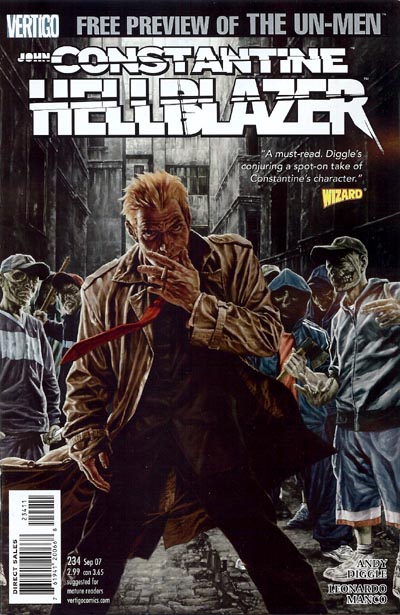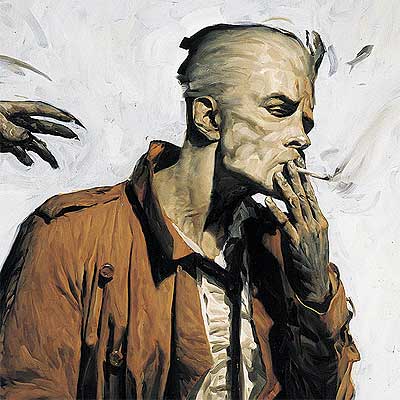The Plot: Our nameless Narrator (Edward Norton) works for a major auto manufacturer, investigating fatal crashes caused by product defects and running cost-benefit analyses to decide whether it’d be more expensive to recall the deadly cars or to pony up settlements in future class-action lawsuits. Sound like an amoral, soul-murdering job to you? Our Narrator agrees and embarks on a fumbling quest for peace. He gets a hearty shove down the path toward enlightenment when a) his apartment full of “versatile solutions for modern living” mysteriously explodes, b) he strikes up a love/hate relationship with the morbid nihilist Marla (Helena Bonham Carter), and c) he joins forces with soap entrepenuer and terrorist mastermind Tyler Durden (Brad Pitt) to found the Fight Club movement.
The Review: It was 1999 and the Earth was facing doomsday. Due to a design vulnerability that was almost as idiotic as the Death Star’s fatal exhaust port, every computer network on the planet was expected to erupt in flames at midnight on New Year’s Eve. Knowing that the world was going to end in a few short months anyway, Hollywood studios collectively said, “Fuck it,” and gambled on a slate of commercially risky and thought-provoking films: American Beauty, Being John Malkovich, Magnolia, The Matrix, Office Space, The Phantom Menace and, of course, Fight Club.
The first rule of Fight Club is, you can’t be ambivalent about Fight Club. It’s unapologetic and outspoken in its critique of modern values. It suggests that an entire generation of American males has been emasculated by consumerism. And it depicts acts of violence (of both the brutal mano-a-mano variety and seditious acts of terrorism) nonjudgmentally.
That last item was the sticking point for many critics of the day, who saw scenes of bare-chested men gathering in parking lots and basements to punch each other into a pulp and freaked the hell out. The brutality of the images blinded many to the message Fight Club tries to convey.
And what is that message? For me, at its most basic level, Fight Club is a challenge to dispense with every manner of artifice, deception, pretense and just plain B.S. that cloaks our social rituals. Fight Club urges us to set aside our vanity, discard the mask of our public personas and reach out to one another with complete honesty.
Our Narrator has been living in a world of shallow artificiality for so long that when he finally experiences an authentic moment of communion with another person (Robert Paulson, played by Meat Loaf and his amazing prosthetic “bitch tits”), he weeps. That exhilarating moment of big, rubbery catharsis is what ultimately sends our Narrator and Tyler Durden on a journey to deflate and subvert the myths we’ve been sold since birth.
And — in the film’s delirious third act –- our Narrator discovers that the grandest illusions of all aren’t even the ones society pawns off on us: They’re the lies we tell ourselves.
But why spend 139 minutes watching this film when you only have 433,617 minutes left to live?
Well, you probably noticed that the world didn’t end on Jan. 1, 2000. Oops. But we’re pretty sure that on Dec. 21, 2012, The Four Horsemen of the Apocalypse and Lou Diamond Phillips will descend from the sky in a lethal hail of sulfur and locusts. And if you’ve seen Fight Club, you’ll be well-prepared, having already come to grips with your own mortality. As our Narrator says, “On a long enough timeline, the survival rate for everyone drops to zero.”
Well, you probably noticed that the world didn’t end on Jan. 1, 2000. Oops. But we’re pretty sure that on Dec. 21, 2012, The Four Horsemen of the Apocalypse and Lou Diamond Phillips will descend from the sky in a lethal hail of sulfur and locusts. And if you’ve seen Fight Club, you’ll be well-prepared, having already come to grips with your own mortality. As our Narrator says, “On a long enough timeline, the survival rate for everyone drops to zero.”












No comments:
Post a Comment